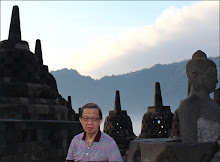Life sucks for A Serious Man

Don’t watch the Coen Brothers’ A Serious Man, if you don’t like dark comedy and unresolved endings. But the message from the movie is something many people are familiar with – that life can turn bad and get worse, without reason or cause.
Main character Larry Gopnik (Michael Stuhlbarg) is a university professor besieged by all kinds of troubles – wife Judith is leaving him for another man, his unemployable, gambling-addict brother is sleeping on the couch, his son takes drugs and shirks school, and his daughter is stealing from his wallet to save for a nose job.
An anonymous letter-writer tries to sabotage Larry’s chances for staying on in his job at the university. A graduate student bribes him for a passing grade while threatening to sue him for defamation. Finally, the good-looking woman next door torments Larry by sunbathing nude.
Struggling to cope, Larry, who is Jewish, seeks advice from three different rabbis (Jewish spiritual teachers). Can anyone give him the right advice to become a righteous person – a mensch – a serious man - who can handle problems and difficulties and stay on top of life?
The movie synopsis is similar to the life story of many of my middle-aged friends who have to handle rebellious teenage kids, a dissatisfied spouse, relatives who are spongers, demanding bosses, knee-joint pains, and other cakesim problems. Life sucks, they say. How could they cope?
Many Singaporeans will reply that the way to cope is to be kiasu—not to lose out, whether to co-workers, neighbours or simply the person queuing in front of you for buffet.
It’s actually a shameful thing to tell foreigners that Singaporeans are well-known to be kiasu, as if we are nothing but mean, envious, competitive creatures, more than willing to shove others aside so that we alone get all the buffet and perks. And if we don’t get them, we want to make sure no one else will!
When I was growing up in the 1950s and 1960s, life was tough for most people but no one ever said life sucked. Instead I remember clearly that in school and at home, the lessons children learnt were on being a good individual, a “true man” (women included). Teachers and parents read to us stories from Chinese classics and history, of exemplary characters who studied hard (and did well in exams!), were filial to parents and faithful to friends, and earnest in serving their community and country.
In those formative years of Singapore as a nation, there were many words to describe Singaporeans, but not once did I come across “kiasu”. As we face the Year of the Tiger, let’s banish this word and all its associative traits once and for all from our action and speech.
Re-focus your life
Whether life sucks or not, is a matter of your own perception. You don’t have to be smart to figure out that when you change your mindset, you change your life. Try it: re-focus your thought and action on courage, self-discipline, and a kindly attitude towards family, friends, co-workers, and even complete strangers.
Thankfully, there is ONE book that sums up all you need to know in developing these three worthwhile traits of courage, self-discipline and a kindly attitude. The Meditations of Marcus Aurelius, a collection of personal reflections, by the Roman Emperor Marcus Aurelius who lived more than 1,800 years ago.
Life really sucked for the emperor: the country was invaded constantly by barbarian tribes, his wife was publicly accused of having affairs, his assistant emperor died while helping in a campaign, troops rebelled, and a third of the population was wiped out by the plague. He himself suffered from poor health and died at age 58 in the cold, harsh climate of northern Europe.
But in the notebook which he wrote for his eyes only, Marcus Aurelius did not moan and whine. Instead, he reflected on what he learnt from his elders, teachers and friends, and how to attune his attitude to cope with constantly changing circumstances and challenges.
And he left behind his Meditations that have since encouraged, inspired and taught countless number of people in the West. A recent example is Bill Clinton, former US President and a driving force in helping poor nations, who keeps the book as his self-help reference guide.
There are many translations available, but I recommend a recent edition in a handy, hardcover format, titled, The Emperor’s Handbook, translated by C Scot hicks and David V Hicks (2002). Get this book from Amazon.com and let the wisest, most compassionate ruler of all times, be your guide and teacher.
A parting word from Marcus Aurelius: “If you care about yourself at all, come to your own aid while there’s still time.”


0 Comments:
Post a Comment
<< Home